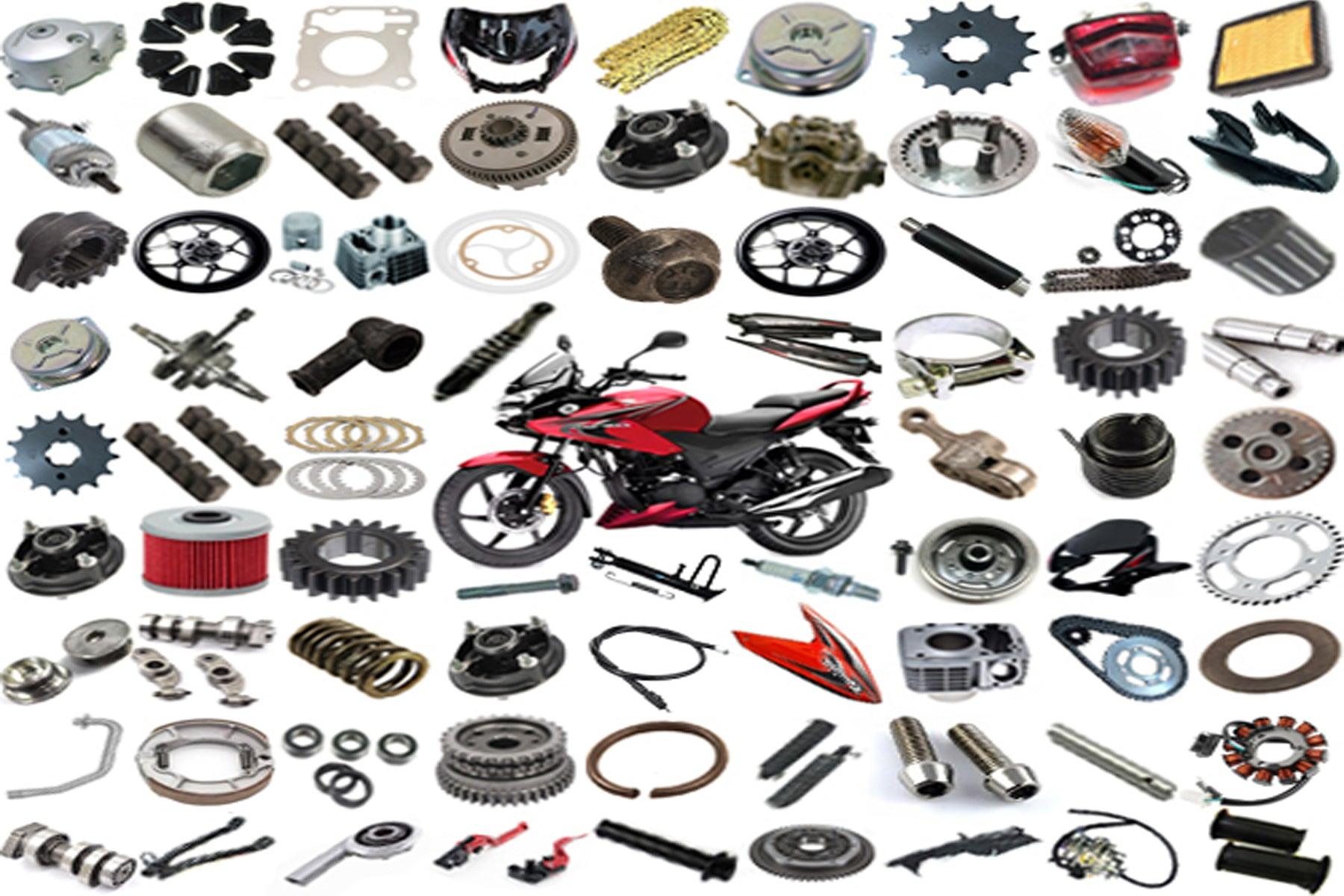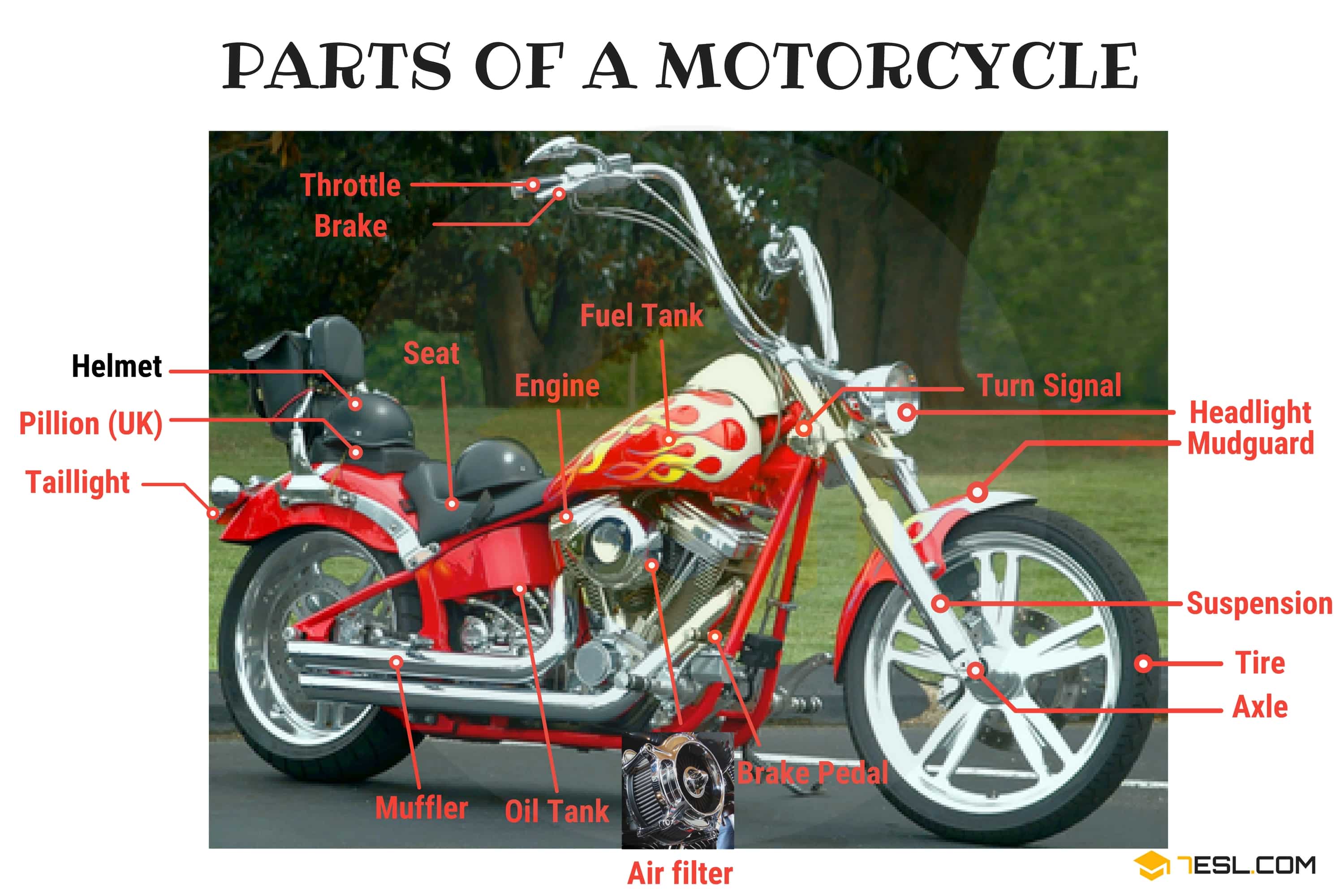Discover the Vital Motorcycle Components You Need for Optimum Performance
Comprehending the important parts of a motorbike is essential for attaining peak efficiency. Each component, from the engine to the stopping system, plays a crucial function in general functionality and safety. Regular maintenance can prevent unanticipated failings and improve the riding experience. Lots of cyclists neglect the details of these systems. Uncovering just how they interact can lead to an extra efficient trip. What critical components should every cyclist prioritize?
The Engine: The Heart of Your Motorcycle
The engine offers as the core part of a bike, driving its performance and defining its capacities. It is liable for converting gas right into mechanical power, which powers the bike onward. Various sorts of engines are utilized, including single-cylinder, V-twin, and inline setups, each offering distinctive attributes fit for various riding functions and styles. The engine size, generally determined in cubic centimeters (cc), significantly influences efficiency, with larger engines usually supplying even more power and torque.Furthermore, the engine's style and innovation, such as fuel injection systems or air-cooling versus liquid-cooling, influence efficiency and reliability. Maintenance is necessary for peak operation; factors like normal oil modifications and checking ignition system warranty long life. Bikers typically consider an engine's responsiveness and level of smoothness, as these attributes enhance the total riding experience. Inevitably, the engine stays a critical element that specifies not only the motorcycle's efficiency yet additionally the rider's connection to the machine.
The Transmission: Shifting Gears Smoothly
The transmission plays an important function in a motorbike's performance, particularly in the technicians of equipment moving. Comprehending just how to move equipments efficiently can improve the total riding experience, while normal upkeep warranties peak performance. Appropriate interest to these elements can substantially impact the durability and efficiency of the bike.

Gear Shifting Mechanics
Smooth gear moving is important for ideal motorbike efficiency, greatly influencing both acceleration and control. The auto mechanics of equipment changing involve the communication in between the clutch, gear lever, and transmission system. When a cyclist involves the clutch, it disengages the engine from the transmission, enabling an equipment adjustment without damaging the elements. A well-timed release of the clutch, incorporated with accurate activity of the gear lever, facilitates a smooth modification between gears. This process ensures that the engine operates within its best power band, boosting performance. Motorcycle Spares Christchurch. In addition, recognizing the gear ratios and their effect on rate and torque can assist bikers make informed choices throughout shifts, ultimately adding to a more delightful and responsive riding experience
Maintenance Tips Importance
Regular maintenance plays an important role in guaranteeing that the transmission system runs efficiently, permitting for smooth gear changes. Regularly checking and changing the transmission fluid is essential, as old fluid can result in enhanced friction and wear. In addition, evaluating the clutch for wear warranties peak interaction and disengagement, stopping slippage during gear changes. Lubrication of moving components is equally crucial to reduce friction and boost efficiency. Motorbike proprietors ought to also keep track of for leakages and uncommon sounds, as these can indicate underlying concerns. By sticking to these maintenance tips, bikers can extend the life expectancy of their transmission system, assuring that gear changes continue to be seamless and adding to the general efficiency of their motorcycle.
The Braking System: Ensuring Safety on Every Ride
Braking systems are basic parts that directly influence a motorbike's safety and security and efficiency. They include numerous parts, consisting of brake pads, blades, calipers, and hydraulic lines, all functioning together to guarantee efficient slowdown. The kind of stopping system-- usually either disc or drum-- affects responsiveness and quiting power.Regular upkeep is necessary to support peak performance; worn brake pads can cause lowered performance and raised stopping ranges. Additionally, the quality of brake fluid ought to be monitored, as it can take in wetness with time, compromising braking efficiency.Riders should additionally consider the significance of anti-lock stopping systems (ABS), which avoid wheel lockup during abrupt stops, boosting overall security. Correctly working brakes are not just concerning stopping; they instill self-confidence in the rider, enabling much safer navigating via various surfaces. Inevitably, a reputable stopping system is vital for appreciating every experience with satisfaction.
The Suspension: Enhancing Convenience and Control
A well-functioning suspension system greatly adds to a motorcycle's overall efficiency, enhancing the performance of the stopping system. The suspension plays a considerable duty in taking in shocks from unequal surface areas, guaranteeing a smoother ride while maintaining tire contact with the roadway. This contact is necessary for both security and control, permitting riders to navigate edges Click This Link with confidence and precision.Different kinds of shock absorber, such as telescopic forks or mono-shocks, use varying degrees of convenience and handling. Correctly tuned suspension enhances responsiveness, providing the cyclist with a much more connected feeling to the motorcycle. Normal upkeep checks are very important to establish the suspension parts, consisting of dampers and springtimes, are functioning at their ideal. An efficient you can try here suspension system not just boosts the riding experience yet additionally adds to the longevity of various other motorcycle parts by lessening deterioration. Therefore, purchasing high quality suspension is important for any type of significant motorcycle lover.
The Tires: Linking You to the Road
Tires play a crucial role in a motorcycle's performance, serving as the main web link between the road and the rider. Comprehending the various sorts of tires offered can greatly affect handling and safety. Additionally, routine upkeep is essential to guarantee peak tire efficiency and longevity.
Tire Keys In Explained
How do different tire types affect a motorbike's efficiency? Tire kinds play a vital role in figuring out a motorcycle's grasp, handling, and security. Sport tires, designed for high performance, offer improved grip and responsiveness on smooth roads, making them perfect for competing and hostile riding. Conversely, touring tires prioritize longevity and comfort, offering a smoother experience for long-distance traveling. Off-road tires, identified by their tough tread patterns, master traction on unpaved surface areas, suitable for experience lovers. Additionally, dual-sport tires mix qualities from both on-road and off-road categories, dealing with functional riding requirements. Eventually, selecting the appropriate tire type is crucial for maximizing performance, ensuring safety and security, and enhancing the general riding experience.
Maintenance Tips Offered
While riding on the roadway, preserving suitable tire condition is important for safety and efficiency. Regularly inspecting tire stress is necessary, as under-inflated tires can cause bad handling and raised wear. It is suggested to check walk deepness regularly; used tires compromise hold and security. On top of that, cyclists must search for indicators of damages, such as splits or bulges, which can suggest the requirement for replacement. Turning tires occasionally ensures also wear, improving longevity. Keeping tires tidy from debris and staying clear of too much aesthetics can prolong their life expectancy. Preserving appropriate positioning and balance contributes to come to a Check Out Your URL head performance, reducing stress and anxiety on various other bike components. Complying with these upkeep tips will considerably enhance the overall riding experience.
The Gas System: Fueling Performance and Effectiveness
The fuel system plays an important role in making best use of a motorbike's performance and effectiveness, as it assures the optimal shipment of gas to the engine. It consists of numerous crucial parts, consisting of the gas container, gas pump, gas filter, and fuel injectors or carburetor. Each component has to operate properly to ensure a powerful and smooth ride.The gas container shops gas and supplies it to the engine using the fuel pump, which creates the needed pressure. A fuel filter avoids contaminants from getting in the engine, while the injectors or carburetor mix gas with air for combustion.Proper upkeep of the gas system is important; a blocked filter or malfunctioning injector can result in reduced performance and enhanced fuel consumption. By verifying that the fuel system runs effectively, bikers can enjoy better throttle feedback, much better gas economic situation, and on the whole enhanced riding experience.
The Electric System: Powering Your Adventure
A reliable electrical system is necessary for the overall capability and security of a motorbike, as it powers vital elements such as the ignition, lights, and various electronic systems. This system includes the battery, which shops power, and the generator, accountable for producing power while the engine runs. The wiring harness connects these parts, ensuring trustworthy power distribution.Additionally, fuses shield the system from overloads, while relays aid regulate high-current tools with low-power signals. A well-kept electric system improves efficiency by ensuring smooth begins and regular operation of lights and signals, essential for biker exposure and safety.Regular checks of the battery's charge and links are essential for protecting against electrical failures. Motorcyclists should likewise check circuitry for wear and tear, making sure all elements work preferably. Eventually, a durable electric system contributes significantly to the overall performance and dependability of the motorcycle.
Regularly Asked Questions
Exactly how Usually Should I Replace My Motorbike's Battery?
The regularity of bike battery replacement depends on usage and upkeep (Motorbike Components NZ). Usually, batteries must be changed every 3 to 5 years. Normal checks can aid identify when a substitute is essential for peak efficiency
What Devices Do I Required for Standard Bike Maintenance?
For standard motorcycle maintenance, one calls for vital devices such as a socket collection, wrenches, screwdrivers, pliers, tire stress scale, and a torque wrench. These tools assist in efficient upkeep and guarantee the motorcycle runs effectively and safely.
How Can I Improve My Motorbike's Aerodynamics?
To boost motorbike aerodynamics, one should consider readjusting fairings, utilizing windshield extensions, optimizing body setting, and reducing general weight. These adjustments aid decrease drag, boosting stability and gas effectiveness throughout experiences.
What Are the Signs of a Failing Electric System?
Indicators of a falling short electrical system consist of lowering lights, trouble starting, uneven instrument readings, and blown integrates. Oem Parts New Zealand. Unusual smells or corrosion around battery terminals may also show underlying problems needing instant attention for safety and security and performance

How Do I Pick the Right Oil for My Motorbike?
When choosing oil for a motorbike, one must think about the supplier's specs, viscosity scores, and the sort of riding. In addition, artificial versus traditional oil can impact efficiency and engine defense, influencing the decision significantly. The engine size, generally measured in cubic centimeters (cc), substantially affects performance, with bigger engines generally providing even more power and torque.Furthermore, the engine's style and innovation, such as fuel shot systems or air-cooling versus liquid-cooling, affect efficiency and integrity. A well-functioning suspension system significantly contributes to a motorbike's general performance, enhancing the performance of the stopping system. The fuel system plays a crucial duty in making best use of a motorbike's efficiency and performance, as it ensures the optimal delivery of gas to the engine. A fuel filter stops contaminants from entering the engine, while the injectors or carburetor mix fuel with air for combustion.Proper upkeep of the fuel system is important; a clogged filter or malfunctioning injector can lead to lowered performance and enhanced gas intake. A well-kept electric system enhances performance by making sure smooth begins and regular procedure of lights and signals, crucial for cyclist visibility and safety.Regular checks of the battery's fee and links are vital for protecting against electrical failures.